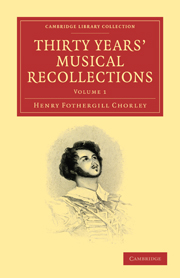THE YEAR 1834
Published online by Cambridge University Press: 29 August 2010
Summary
The prosperity of this year, so far as Opera was concerned, was referable to the appearance of Mdlle. Grisi, and to the immediate place of supremacy—then less easy to conquer than now—which she assumed on a stage, from which a Pasta and a Malibran had only just vanished. The small number of operas produced tells of itself a tale of the complete success of the new singer's fascinations. There was only one novelty—the Italian version of “Le Siége de Corinthe,” by Signor Rossini, arranged for the Opera of Paris from his “Maometto,”—with some important additions.
The world has been too willing to let this work go,—perhaps, because the cause of Greek liberty, to which it was meant to appeal, soon ceased to warm anyone: the dull arrangement of the story, too, precluding its finding a place among such dramas “for all time,” as are “Massaniello,” and “Les Huguenots.” Yet “Le Siége de Corinthe” contains music too noble to be forgotten :—first among these the Overture. A Rossinian prelude though this be—and as such to be derided by classical souls, who are enamoured of many a piece of unidea'd German dullness—there is a grandeur in the introduction—there is a burning and brilliant force in the allegro, only in character and vivacity outdone by the prelude to “Guillaume Tell”—The quickstep forming the second subject of the allegro is more dependant for its character on rhythm than most of its master's themes; but the spirit with which it is wrought up is rare—even for Signor Rossini.
- Type
- Chapter
- Information
- Thirty Years' Musical Recollections , pp. 71 - 90Publisher: Cambridge University PressPrint publication year: 2009First published in: 1862



